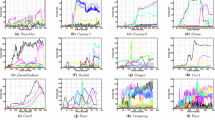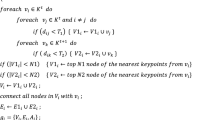Abstract
The visual tracking of image regions is a research area of great interest within the computer vision community. One issue which has received quite attention in the last years has been the analysis of tracking algorithms which could be able to cope with changes in the appearance of the target region. Probably one of the most studied techniques proposed to model this appearance variability is that based on linear subspace models. Recently, efficient algorithms for fitting these models have been developed too, in many cases as an evolution of well studied approaches for the tracking of fixed appearance images.
Additionally, new methods based on second order optimizers have been proposed for the tracking of targets with no appearance changes. In this paper we study the application of such techniques in the design of tracking algorithms for linear appearance models and compare their performance with three previous approaches. The achieved results show the efficiency of the use of second-order minimization in terms of both number of iterations required for convergence and convergence frequency.
Preview
Unable to display preview. Download preview PDF.
Similar content being viewed by others
References
Baker, S., Gross, R., Matthews, I.: Lucas-Kanade 20 Years On: A Unifying Framework: Part 3 Technical Report CMU-RI-TR-03-35 (2004)
Benhimane, S., Malis, E.: Real-time image-based tracking of planes using efficient second-order minimization. In: Proc. IROS 2004 (2004)
Baker, S., Matthews, I.: Lucas-Kanade 20 years on: A unifying framework: Part 1. Int. Journal of Computer Vision 56(3), 221–255 (2004)
Baker, S., Matthews, I.: Equivalence and efficiency of image alignment algorithms. In: Proc. of International Conference on Computer Vision and Pattern Recognition, pp. 1090–1097 (2001)
Lucas, B.D., Kanade, T.: An iterative image registration technique with application to stereo vision. In: IJCAI 1981, pp. 674–679 (1981)
Hager, G., Belhumeur, P.: Belhumeur: Efficient region tracking with parametric models of geometry and illumination. IEEE Transactions on Pattern Analysis and Machine Intelligence, 1025–1039 (1998)
Black, M., Jepson, A.: Eigen-tracking: Robust matching and tracking of articulated objects using a view-based representation. International Journal of Computer Vision 26(1), 63–84 (1998)
Buenaposada, J., Munoz, E., Baumela, L.: Efficient appearance-based tracking. In: IEEE Workshop on Articulated and Nonrigid Motion (2004)
Cootes, T.F., Edwards, G.J., Taylor, C.J.: Active appearance models. IEEE Transactions on Pattern Analysis and Machine Intelligence, 681–685 (2001)
Author information
Authors and Affiliations
Editor information
Editors and Affiliations
Rights and permissions
Copyright information
© 2006 Springer-Verlag Berlin Heidelberg
About this paper
Cite this paper
Gonzalez-Mora, J., Guil, N., Zapata, E.L. (2006). Tracking of Linear Appearance Models Using Second Order Minimization. In: Blanc-Talon, J., Philips, W., Popescu, D., Scheunders, P. (eds) Advanced Concepts for Intelligent Vision Systems. ACIVS 2006. Lecture Notes in Computer Science, vol 4179. Springer, Berlin, Heidelberg. https://doi.org/10.1007/11864349_91
Download citation
DOI: https://doi.org/10.1007/11864349_91
Publisher Name: Springer, Berlin, Heidelberg
Print ISBN: 978-3-540-44630-9
Online ISBN: 978-3-540-44632-3
eBook Packages: Computer ScienceComputer Science (R0)




